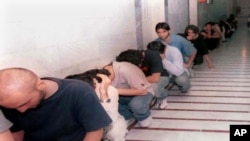In his remarks last year in Cairo, President Barack Obama spoke of the advantages to all societies from the free exercise of speech and the open exchange of ideas:
"Governments that protect these rights are ultimately more stable, successful and secure. Suppressing ideas never succeeds in making them go away. America respects the right of all peaceful and law-abiding voices to be heard around the world, even if we disagree with them."
The same cannot be said for the government of Iran, which is intent on stifling the peaceful and law-abiding voices of its own citizens, as it has demonstrated in its continuing crackdown on journalists, lawyers and human rights activists. And the Iranian government is demonstrating a similar stifling in what should be the nation's bastions of communication and circulation of ideas –- its universities.
In October, senior Iranian education official Abolfazl Hassani announced new restrictions on 12 university social sciences considered to be based on Western thought and deemed to be incompatible with Islamic principles. The subjects include philosophy, law, psychology, political science, women's studies, and human rights. Mr. Hassani said no new departments in these areas would be allowed to open, and the content of current programs would be revised up to 70 percent over the next few years.
And academic content is not the only area the government is determined to control. Starting in 2006, in what has been called a second cultural revolution, dozens of Iranian university professors, many from political science or law departments, have been fired or forced into early retirement.
Student activists have been targeted for arrest, or for suspension from their studies -- measures which violate Iran's international obligations regarding the right to education, enshrined in the Universal Declaration of Human Rights and the International Covenant on Economic, Social and Cultural Rights which Iran has ratified.
As President Obama has said, Iran is a great civilization with centuries-long contributions in literature, art and innovation. Such contributions are not possible if freedom of speech and thought is denied; if professors are barred from teaching, and students from learning.
It is time for Iranian authorities, in President Obama's words, to "pursue a better future ... [and] meet its international responsibilities, while respecting the dignity and fundamental human rights of its own people."




